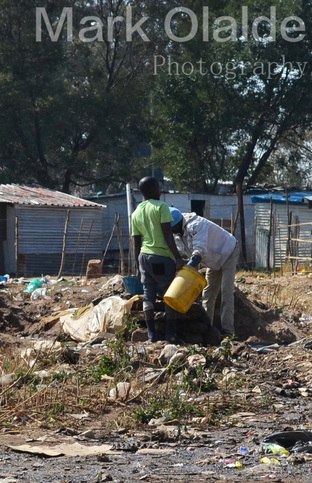 Mine entrance that slopes down into an abandoned mine and is used by zama zamas.
Mine entrance that slopes down into an abandoned mine and is used by zama zamas. Sharp, sharp!
“It’s happening in the Northern Cape already. It’s happening in the Free State. It is happening in Mpumalanga. It is happening in Limpopo. It is happening in the North West, and it is happening in Gauteng, just to our knowledge. In all likelihood it is probably also happening in KwaZulu-Natal," Commissioner Janet Love of the South African Human Rights Commission asserted.
Last week, the Commission held a press conference to mark the publication of its investigation into "unregulated artisanal" mining around South Africa. As the commissioner acknowledged, there exist many names for the same issue, that of small-scale illegal mining activities. Their 76-page report outlined numerous facets of this issue: A dearth of academic research, international reach, threats to legal mining and its infrastructure, health and safety concerns, failed mine rehabilitation and much more.
The Commission estimated that between 8,000 and an unknown number north of 30,000 people work in this type of mining in South Africa alone. According to the Department of Health, just shy of 1 million ex-mineworkers live in the country. The "ex" often results from retrenchment or firing, not from choice. In a country with massive unemployment levels (refer to my former post of statistics) -- and with an issue in need of further research, as the Commission pointed out -- it would not be a stretch to imagine many of these former mineworkers returning to abandoned mines to make a living with the skills they possess. Further, a lack of regulation by the government and compliance by companies has led to thousands of abandoned, derelict or ownerless mines around the country, providing the perfect site for these mining activities.
“It’s happening in the Northern Cape already. It’s happening in the Free State. It is happening in Mpumalanga. It is happening in Limpopo. It is happening in the North West, and it is happening in Gauteng, just to our knowledge. In all likelihood it is probably also happening in KwaZulu-Natal," Commissioner Janet Love of the South African Human Rights Commission asserted.
Last week, the Commission held a press conference to mark the publication of its investigation into "unregulated artisanal" mining around South Africa. As the commissioner acknowledged, there exist many names for the same issue, that of small-scale illegal mining activities. Their 76-page report outlined numerous facets of this issue: A dearth of academic research, international reach, threats to legal mining and its infrastructure, health and safety concerns, failed mine rehabilitation and much more.
The Commission estimated that between 8,000 and an unknown number north of 30,000 people work in this type of mining in South Africa alone. According to the Department of Health, just shy of 1 million ex-mineworkers live in the country. The "ex" often results from retrenchment or firing, not from choice. In a country with massive unemployment levels (refer to my former post of statistics) -- and with an issue in need of further research, as the Commission pointed out -- it would not be a stretch to imagine many of these former mineworkers returning to abandoned mines to make a living with the skills they possess. Further, a lack of regulation by the government and compliance by companies has led to thousands of abandoned, derelict or ownerless mines around the country, providing the perfect site for these mining activities.
 Artisanal miners processing ore in an informal settlement near an illegal mining operation.
Artisanal miners processing ore in an informal settlement near an illegal mining operation. As with any unregulated and illegal activity, however, artisanal mining propagates other dangerous variables such as criminal syndicates and violent clashes. In 2010, the government cited a statistic, which said the legal mining sector lost about R6 billion ($455+ million) every year through illegal mining. A factsheet published this year by the Chamber of Mines estimated that between 5-10 percent of annual gold mining is stolen product.
At the same time, stereotypes pervade the myth of zama zamas. They are believed to be all foreigners working illegally (in a country where all tuk shop owners are Pakistani, all criminals are Nigerian, all Zimbabweans are taking jobs, etc.....). Sordid details from the world of zama zamas -- family's living underground with the workers, the handling of mercury in the processing of ore, the cave-ins -- find their way into newspapers and serve to continue this dialogue.
Yet, there are those pushing for reforms to fix this system. As the Commission cited in its report, one potential solution is slowly bringing zama zamas into the realm of legality. Some researchers and politicians are championing this effort that would give illegal miners assistance in applying for permits to mine. The Commission even suggested turning over abandoned mines that are under the supervision of the government to these miners.
A cooperative approach among mining companies, government departments, community groups and artisanal miners is undoubtedly needed to fully address this black market-industry, but any real solution continues to evade all interested parties.
Cheers,
Mark
At the same time, stereotypes pervade the myth of zama zamas. They are believed to be all foreigners working illegally (in a country where all tuk shop owners are Pakistani, all criminals are Nigerian, all Zimbabweans are taking jobs, etc.....). Sordid details from the world of zama zamas -- family's living underground with the workers, the handling of mercury in the processing of ore, the cave-ins -- find their way into newspapers and serve to continue this dialogue.
Yet, there are those pushing for reforms to fix this system. As the Commission cited in its report, one potential solution is slowly bringing zama zamas into the realm of legality. Some researchers and politicians are championing this effort that would give illegal miners assistance in applying for permits to mine. The Commission even suggested turning over abandoned mines that are under the supervision of the government to these miners.
A cooperative approach among mining companies, government departments, community groups and artisanal miners is undoubtedly needed to fully address this black market-industry, but any real solution continues to evade all interested parties.
Cheers,
Mark
 RSS Feed
RSS Feed
